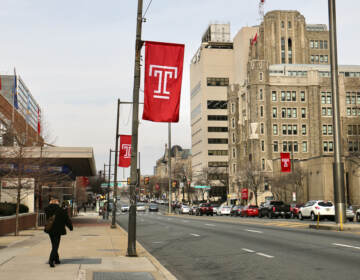Pa. set to study education funding formula — again
 De Visu / Shutterstock.com) " title="ssstudentclassroomx1200" width="1" height="1"/>
De Visu / Shutterstock.com) " title="ssstudentclassroomx1200" width="1" height="1"/>
A panel will begin studying how Pennsylvania could better allocate money for public education, following Gov. Tom Corbett’s signing legislation establishing the commission this week.
Education funding in Pennsylvania is currently divided and sent to the state’s 500 school districts based on the whim of the Legislature.
Education advocates have been pressing for a rational, data-driven formula that takes into account a district’s actual enrollment numbers and student demographic data – reasoning that impoverished students and English-language learners should receive a greater share of the state’s basic education subsidy.
The legislation, sponsored by state Rep. Bernie O’Neill, R-Bucks, asks lawmakers to study the issue and make a recommendation by next year.
O’Neill did not return requests for comment.
State budget secretary Charles Zogby lauded the measure.
“I think there’s fairly broad agreement in Harrisburg that the funding formula needs to be examined,” he said.
While education advocates praised the aims of the new commission, some questioned its necessity.
“It’s very exciting that Rep. O’Neill stepped forward and got this bill through the House and Senate, because it’s an indication that there is strong feeling that we are not doing right by many of our school districts,” said Donna Cooper, executive director of Public Citizens for Children and Youth.
But, she said, “it’s disappointing that we have to do this again, since the study that looked at this is so recent.”
In 2006, under Gov. Ed Rendell, the Republican-controlled Legislature analyzed the state’s method for distributing education funds in a “costing-out study” and, in 2008, implemented the type of formula for which advocates have been campaigning.
This formula not only provided a mechanism for allocating state resources, but operated on the premise that funding levels should be raised to meet the actual cost of educating all students to the state’s standards.
In 2011, faced with Great Recession-era revenue collection, the newly elected Corbett scrapped that formula.
“There were some things in the costing-out study that made a lot of sense,” said Zogby, alluding to the fact that it looked at the “actual needs of the student.”
But, he said, there were problems.
“The part of the costing-out study that required billions of dollars of new funding was always unrealistic,” he said.
Zogby says Rendell was only able to fund education at higher levels by utilizing federal stimulus funds and using funds that he says should have been dedicated to teacher pension payments, Zogby said. “The bills are coming due now for pensions,” he said.
Only ‘how,’ not ‘how much’
The new commission will examine only resource allocation, not funding levels.
Cooper hopes that changes as members of the commission study the issue.
“We’re hopeful that commission members will understand that taking existing resources and looking at how to spend them is only one part of their charge,” she said.
State Sen. Vincent Hughes, D-Philadelphia, called the commission a “postponement and an abrogation of the responsibilities of this governor and the majorities in the House and Senate to … fund public education.”
Hughes attempted to add an amendment to the bill that would have directed the commission to study funding levels, but it was defeated.
“It’s one thing to have a formula, but if you don’t have the dollars that go into that formula, then what’s the point?” Hughes said. “You can have a great recipe for soup, but if you don’t have the ingredients to put into that recipe, there’s no soup.”
Zogby remains hopeful that the commission will make state public education more equitable for all.
This “sets the table for a good spirited discussion. We all want to see a funding system that’s fair for the kids and fair for the districts,” but getting there is going to be a “challenge,” he said, “particularly if we’re still in an environment that is resource constrained.”
WHYY is your source for fact-based, in-depth journalism and information. As a nonprofit organization, we rely on financial support from readers like you. Please give today.





